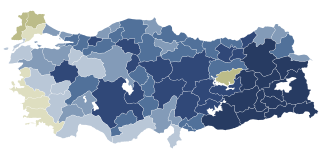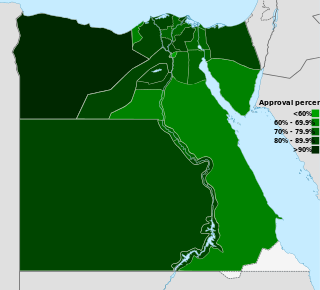
A referendum is a direct vote by the electorate on a proposal, law, or political issue. This is in contrast to an issue being voted on by a representative. This may result in the adoption of a new policy or specific law, or the referendum may be only advisory. In some countries, it is synonymous with and also known as plebiscite, votation,popular consultation, ballot question, ballot measure, or proposition.
A constitutional amendment is a modification of the constitution of a polity, organization or other type of entity. Amendments are often interwoven into the relevant sections of an existing constitution, directly altering the text. Conversely, they can be appended to the constitution as supplemental additions, thus changing the frame of government without altering the existing text of the document.
A double majority is a voting system which requires a majority of votes according to two separate criteria. The mechanism is usually used to require strong support for any measure considered to be of great importance. Typically in legislative bodies, a double majority requirement exists in the form of a quorum being necessary for legislation to be passed.

A referendum, in the Italian legal system is a request directed to the whole electorate to express their view on a determined question. It is the main instrument of direct democracy in Italy.
Same-sex marriage has been legal in Slovenia since 9 July 2022 in accordance with a ruling from the Constitutional Court of Slovenia. The court ruled that the ban on same-sex marriages violated the Constitution of Slovenia and gave the Slovenian Parliament six months to amend the law to align with the ruling, although the decision took effect immediately after publication. The National Assembly passed legislation on 4 October 2022, which was vetoed by the National Council one week later, but the veto was then overridden by the National Assembly on 18 October 2022.
State ratifying conventions are one of the two methods established by Article V of the United States Constitution for ratifying proposed constitutional amendments. The only amendment that has been ratified through this method thus far is the 21st Amendment in 1933.

Referendums are held only occasionally by the Government of New Zealand. Referendums may be government-initiated or held in accordance with the Electoral Act 1993 or the Citizens Initiated Referenda Act 1993. Nineteen referendums have been held so far. Fourteen were government-led, and five were indicative citizen initiatives.

Lesbian, gay, bisexual, and transgender (LGBT) rights in Slovenia have significantly evolved over time, and are considered among the most advanced in Eastern Europe. Slovenia was the first post-communist country to have legalised same-sex marriage, and anti-discrimination laws regarding sexual orientation and gender identity have existed nationwide since 2016.

A constitutional referendum on electoral reform was held in Turkey on 21 October 2007. After the aborted attempt to elect the next president in May 2007, the government of Recep Tayyip Erdoğan introduced substantial electoral reforms in parliament which were then passed with the votes of Erdoğan's Justice and Development Party and the opposition Motherland Party.
Referendums in Taiwan at both the national and local level are governed by the Referendum Act of Taiwan, which was enacted by the Legislative Yuan in December 2003. Citizens can propose laws via referendums at the national and local levels. The Referendum Act also allowed people to make changes or abolish laws by referendums.

A constitutional referendum to amend the constitution of Latvia in order to allow one-tenth of the total registered electorate to initiate a popular referendum to dissolve the Latvian parliament was held in Latvia on 2 August 2008.

A constitutional referendum was held in Egypt on 19 March 2011, following the 2011 Egyptian revolution. More than 14 million (77%) were in favour, while around 4 million (23%) opposed the changes; 41% of 45 million eligible voters turned out to vote.
A fifteen-part constitutional referendum was held in Colombia on 25 October 2003. Whilst all fifteen proposals were approved by voters, only one question had a sufficient numbers of votes to pass the 25% quorum requirement.
A referendum is a direct vote in which an entire electorate is asked to either accept or reject a particular proposal. This article summarises referendum laws and practice in various countries.

A referendum on a bill legalising same-sex marriage was held in Slovenia on 20 December 2015. The bill was rejected, as a majority of voters voted against and the votes against were more than 20% of registered voters.
A referendum on a law governing the Divača-Koper rail upgrade was held in Slovenia on 24 September 2017. The referendum was marked by a low turnout; a majority of voters voted in favour of the proposed law. The results were annulled by the Supreme Court in March 2018, resulting in a new referendum being held in 13 May 2018.
A referendum on a law governing the Divača-Koper rail upgrade was held in Slovenia on 13 May 2018. It followed the annulment of the results of a 2017 referendum on the same subject by the Supreme Court in March 2018. The result saw just 309 more votes cast against the law (50.06%) than in favour (49.94%). Voter turnout was even lower than in 2017, at around 15%, meaning that the requirement of 20% of the electorate casting a "no" vote to validate the referendum outcome was not met. As a result, the law remained in force.

2019 European Parliament elections were held in Slovenia on 26 May 2019. This was the most recent in the series of four elections held over the period of two years.

A constitutional referendum was held in Liberia on 8 December 2020 alongside Senate elections and two by-elections to the House of Representatives. It had been planned for 13 October, but was postponed due to the COVID-19 pandemic. Voters were asked whether they approved of eight amendments to the constitution, voting separately on each one. Although a majority of valid votes were in favour for each proposal, the two-thirds quorum was not met for any proposal.
A referendum on amendments to the Waters Act was held in Slovenia on 11 July 2021. According to the environmental activists and the domain experts, the provisions of the law would have detrimental effects on the environment and on clean water. With one of the highest turnouts in recent history, the Act was overwhelmingly rejected by the voters.










